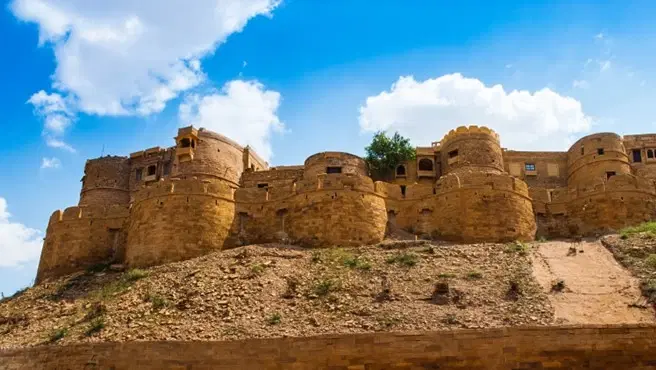
Hotels
•03 min read

Akbar Fort Ajmer is a gem of India's rich history. Its walls whisper tales of Mughal grandeur and cultural fusion. This blog post dives into Akbar Fort Ajmer's history, its impressive architecture, and the treasures housed in its museum. You will learn why this monument is vital to understanding Akbar's legacy in Ajmer. Our guide answers common questions and provides useful details for planning a visit. Enjoy the journey into one of Ajmer's most iconic Mughal monuments.
Emperor Akbar had a strong bond with Ajmer. He visited the city on a sacred pilgrimage to Ajmer Sharif Dargah. His journey was not only spiritual but also a mission to help shape the city. Today, Akbar Fort Ajmer stands as a symbol of his inclusive spirit and his desire for cultural unity. The fort echoes his vision and passion for fostering a society that embraces diversity.
The fort's origins date back to the late 16th century. It was built under the guidance of Emperor Akbar. The design of Akbar Fort was inspired by strategic needs and a desire to safeguard the city. Over time, the fort became a center of Mughal administration. It played a pivotal role in the decisions that shaped the era. Its walls hold secrets of political strategy and powerful cultural influences.
Akbar Fort Ajmer is renowned for its typical Mughal design. The architecture shows classic features such as robust walls, arched gateways, and detailed ornamentation. The layout is simple, yet each structure is crafted with precision. The builders chose durable materials that still hold strong after centuries. This Mughal fort's design speaks of the elegance and strength that defined the era. Every stone of the fort carries the signature style of Akbar fort architecture.
Ajmer is home to many remarkable Mughal monuments. Akbar Fort stands out because of its dual role as a military stronghold and administrative center. Unlike Adhai Din Ka Jhonpra which is celebrated for its ancient religious significance, or Taragarh Fort known for its strategic prominence, Akbar Fort Ajmer blends history with art. It is not just a fort; it is a canvas that reflects Mughal design and the spirit of an empire. This set of historical forts in Ajmer invites travelers to compare styles and appreciate the diversity of India's heritage.

The Akbar Fort Museum offers a unique chance to step back in time. Inside its walls, you can find a variety of exhibits. These include Mughal artifacts, ancient manuscripts, and relics that tell the story of a glorious era. Each piece has a story that connects to the past. The museum plays an important role in preserving Akbar fort history. It is a treasure trove for anyone keen to understand how culture and art grew under Mughal influence.
A visit to the fort museum is both informative and inspiring. Exhibits are displayed in well-organized galleries. Visitors can join guided tours that explain the significance of each piece. Interactive displays add an engaging touch to the experience. The museum is a highlight among Ajmer tourist attractions. It helps visitors see beyond the stone walls and understand the cultural depth of Akbar fort Ajmer.
Insight Corner: "Did You Know?"
Akbar Fort Ajmer was not just a military stronghold but also served as an administrative hub during the Mughal era. It symbolizes Akbar’s inclusive approach to governance, as seen in his pilgrimage to Ajmer Sharif Dargah.
When planning your visit, it is essential to know the detailed timings and ticket pricing. Akbar Fort Ajmer opens daily at a scheduled time. Ticket prices are kept modest to make history accessible to everyone. It is wise to check the timings before planning a trip, as peak times may be crowded. Visiting during off-peak hours provides a peaceful experience. This planning aspect enhances your tour and gives you ample time to explore the fort thoroughly.
Several wonderful attractions add more charm to Ajmer. Besides exploring Akbar Fort Ajmer, you can visit Ana Sagar Lake for a serene view and Ajmer Sharif Dargah for a spiritual experience. These places to visit in Ajmer collectively offer a full day of adventure. An itinerary that covers multiple sites allows you to immerse yourself in the region's historical and cultural beauty. Such planning ensures that you gain a comprehensive understanding of Mughal monuments in Ajmer.

Akbari Fort was built by Emperor Akbar in the late 16th century.
Akbar visited Ajmer to perform prayers at the Ajmer Sharif Dargah and to engage with the city's spiritual and cultural heritage.
Akbar Fort is one of the most famous forts in Ajmer due to its historical importance and unique architectural design.
Ajmer Fort has been central to Mughal administration and symbolizes Akbar's lasting legacy in the region.
The fort is open daily from the time prescribed by local guidelines, ensuring that visitors can experience its history at leisure.
Akbar Fort Ajmer is a window to the past. Its rich history, striking architecture, and the wonderful museum make it a must-visit location. The fort reveals the depth of Akbar's vision and the cultural tapestry of the Mughal era. Whether you are a history buff or a curious traveler, experiencing this heritage site is both educational and inspirational. This journey through Mughal monuments in Ajmer reminds us of the enduring legacy of a great emperor. Dive deep into the charm of Akbar fort Ajmer and let its timeless stories inspire your next adventure.